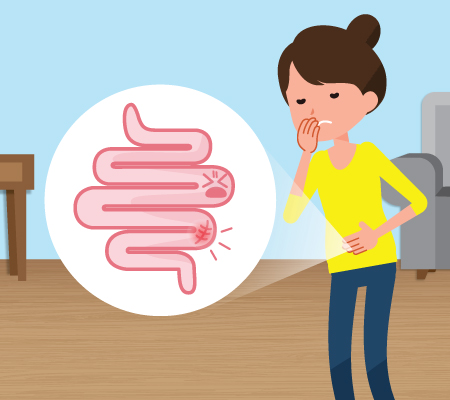Inflammatory bowel disease (IBD) involves chronic inflammation of the digestive tract. Crohn’s disease is a type of IBD that can inflame the lining of your digestive tract (from your mouth to your bottom), and often spreads deep into affected tissue.

“Everyone is different,” said Kari Mizgalski, registered dietitian with Marshfield Clinic Health System. “It really depends where the disease affects the patient, as well as the severity of inflammation. People with severe inflammation have more difficulty absorbing nutrients and tolerating food in general, where people with mild to moderate inflammation may be able to tolerate a wider variety of foods.”
Mizgalski was diagnosed with Crohn’s disease when she was 19 years old. Originally, she planned to become a physician assistant, but changed her mind because she was more interested in nutrition. She wanted to be a dietitian and help people with these types of dietary needs, especially after she was able to improve her Crohn’s symptoms with the help of a dietitian. (Note: Diet does not cure or control Crohn’s, but can lessen symptoms).
“It’s hard to follow a healthy diet with Crohn’s,” she said. “If you aren’t feeling well, you can sometimes only tolerate simple carbohydrates like crackers and white pasta. It’s difficult to get a variety of nutrients, and on top of that, your body isn’t absorbing nutrients well.”
Flare ups with Crohn’s
With a Crohn’s disease flare-up, you might experience symptoms like diarrhea, rectal bleeding, urgent need for a bowel movement, abdominal cramps or constipation. A high fiber diet during a flare up will likely make your symptoms worse. When IBD is controlled and inflammation levels are low, it may be recommended to slowly increase the fiber in your diet. Following a high fiber, anti-inflammatory diet during times of remission may help reduce inflammation and the risk for colon cancer.
IBS is not IBD
If you are questioning your symptoms, it’s important to find out more. Irritable bowel syndrome (IBS), which is often confused with IBD, has overlapping symptoms, but involves different treatment. Request an appointment with your primary care provider to discuss concerns, and you may be referred to a gastroenterologist for further diagnostics.
A lot of people are uncomfortable about bringing up the topic,” Mizgalski said. “And then, they don’t want to eat because they are afraid they will have to go to the bathroom. It’s important to reach out for help.”
Trigger foods
Whether you have a flare up or not, trigger foods worsen your symptoms. Caffeine and alcohol are trigger foods, but many others can affect your body as well.
Some people may benefit from the Low FODMAP diet. FODMAP stands for fermentable oligo-, di-, mono-saccharides and polyols. These carbohydrates can trigger digestive symptoms like diarrhea, bloating, gas and stomach pain in sensitive people.
Keep a food journal
I don’t want people to completely eliminate foods,” Mizgalski said. “It’s important to find out what works well with your body as everyone is different. Most dietitians will advise patients to keep a food journal.”
After reviewing your journal, your provider can make suggestions on what nutrition plan works well for you and address concerns throughout your life accordingly.
Request a visit with a dietitian if you have been diagnosed with Crohn’s disease. This provides you with resources and helps you through the journey of living with Crohn’s.






Leave a Reply